The Bravest Families in America
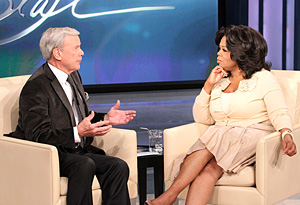
Do you know someone fighting on the front lines in Iraq or Afghanistan? How about a family in your town that has a loved one serving? Legendary newsman Tom Brokaw says if you can't say yes to one of these questions, then you don't really care about the war or the men and women who are fighting in it. Tom says what concerns him most is that people don't think about the sacrifices that these brave soldiers and their families are making for our freedom.
The current wars in Afghanistan and Iraq are the longest in United States history—longer than World War II and Vietnam. Tom says it's not just the length of time that has made these current wars different than past ones—it's our country's level of engagement. He says World War II united our country in an effort to save the world, and while we were deeply divided during Vietnam, the whole country was still very aware about what was happening. Today's wars are not something the typical American thinks about every day, and according to Tom, "less than 1 percent of the American population is bearing 100 percent of the burden of battle."
"I, as a political reporter, believe very strongly that this democratic republic cannot have something that involves our blood and treasure assigned to only a very small part of our population, and nothing else is asked of the rest of us," Tom says. "That’s not just unjust. In a way, it's immoral."
Tom says we all have to "re-enlist as citizens." That means raising our consciousness about the wars—to think about the men and women who are fighting every day and losing their lives—and also to do something about it.
"However you feel about the war and the appropriateness of it, you must honor these people and their families," Tom says.
The current wars in Afghanistan and Iraq are the longest in United States history—longer than World War II and Vietnam. Tom says it's not just the length of time that has made these current wars different than past ones—it's our country's level of engagement. He says World War II united our country in an effort to save the world, and while we were deeply divided during Vietnam, the whole country was still very aware about what was happening. Today's wars are not something the typical American thinks about every day, and according to Tom, "less than 1 percent of the American population is bearing 100 percent of the burden of battle."
"I, as a political reporter, believe very strongly that this democratic republic cannot have something that involves our blood and treasure assigned to only a very small part of our population, and nothing else is asked of the rest of us," Tom says. "That’s not just unjust. In a way, it's immoral."
Tom says we all have to "re-enlist as citizens." That means raising our consciousness about the wars—to think about the men and women who are fighting every day and losing their lives—and also to do something about it.
"However you feel about the war and the appropriateness of it, you must honor these people and their families," Tom says.
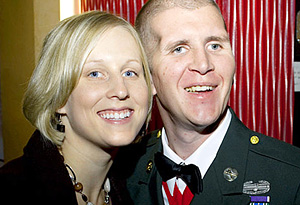
Tom wants to introduce one of the bravest families he knows—Corey and Jenny from Yankton, South Dakota.
Meet Corey and Jenny
While serving with the National Guard in 2005, Corey and his outfit were hit by a roadside bomb. Three men were killed and Corey was gravely wounded. Doctors initially told Jenny that Corey wasn't going to make it, but miraculously, Corey survived.
Life will never be the same for Corey, Jenny and their two young children. After his experience in Iraq, Corey is now blind and has severe brain injuries. He has difficulty with his speech, and Jenny helps him communicate.
"Our biggest sacrifice is time," says Jenny. "When we picked up the pieces at the hospital, we lost time there because I left home and I missed our son's first steps, his first words. We both missed it. Even here without [Corey's] sight, he feels like he's missing out. Yes, he's living every moment with us, but he's not getting to see his kids grow up."
Meet Corey and Jenny
While serving with the National Guard in 2005, Corey and his outfit were hit by a roadside bomb. Three men were killed and Corey was gravely wounded. Doctors initially told Jenny that Corey wasn't going to make it, but miraculously, Corey survived.
Life will never be the same for Corey, Jenny and their two young children. After his experience in Iraq, Corey is now blind and has severe brain injuries. He has difficulty with his speech, and Jenny helps him communicate.
"Our biggest sacrifice is time," says Jenny. "When we picked up the pieces at the hospital, we lost time there because I left home and I missed our son's first steps, his first words. We both missed it. Even here without [Corey's] sight, he feels like he's missing out. Yes, he's living every moment with us, but he's not getting to see his kids grow up."
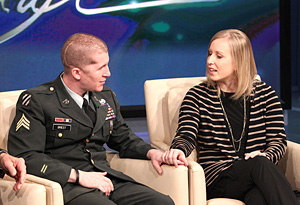
Since returning from Iraq, Corey says his life has changed dramatically. Simple things that he once did every day are now a struggle, like helping around the house or reading to his children.
"It is a huge adjustment, not only for Corey but for me [too]," says Jenny. "I went from wife to caregiver. And for our kids, they grew up fast. They had to. Now, instead of Corey reading to [our daughter] Kylie and Corey helping Kylie, it's the other way around."
Watch Corey and Jenny's "new normal"
Corey attends both speech and physical therapy and also goes to job training three days a week. There, he is given a chance to do small tasks on his own and also to train for a job in the future. Corey was working to become a paramedic before his deployment, but now his dreams have changed.
"Families in this country need to know what they can do, and what Jenny and I have talked about, is that you can just go to the door and say 'How can I help?' You can leave something. [Jenny] has her sidewalk and her driveway shoveled by friends in Yankton. So it's a small thing," says Tom. "I think a lot of people are reluctant to reach out, but [these military families] want to know that you are aware of what's going on. They're living in their own war zone, and that's not right for this country."
"It is a huge adjustment, not only for Corey but for me [too]," says Jenny. "I went from wife to caregiver. And for our kids, they grew up fast. They had to. Now, instead of Corey reading to [our daughter] Kylie and Corey helping Kylie, it's the other way around."
Watch Corey and Jenny's "new normal"
Corey attends both speech and physical therapy and also goes to job training three days a week. There, he is given a chance to do small tasks on his own and also to train for a job in the future. Corey was working to become a paramedic before his deployment, but now his dreams have changed.
"Families in this country need to know what they can do, and what Jenny and I have talked about, is that you can just go to the door and say 'How can I help?' You can leave something. [Jenny] has her sidewalk and her driveway shoveled by friends in Yankton. So it's a small thing," says Tom. "I think a lot of people are reluctant to reach out, but [these military families] want to know that you are aware of what's going on. They're living in their own war zone, and that's not right for this country."
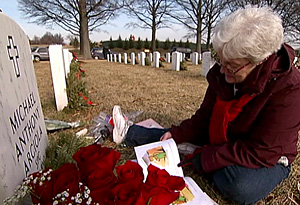
Legendary Washington Post reporter Bob Woodward has written five best-selling books about the wars in Iraq and Afghanistan. Bob says there is an epidemic of disconnection in America, and it's crucial to the future of our country to change that.
"As Tom Brokaw has said, these are defining wars. It's going to define where this country goes. We need to be involved," says Bob.
Like Tom, Bob wants the voices of soldiers and their families to be heard. He introduces us to Teresa—a military mom whose son, Private First Class Michael Arciola, was killed in Iraq in 2005.
Watch Teresa's story
Teresa goes to Arlington National Cemetery five or six times a year to visit her son's grave. Each time she goes, she spends the day at his graveside, playing his favorite music and reading his favorite childhood book. She says she does this because it makes her feel like she is still doing something for him.
"It doesn't get any easier, even though it's been six years. I'm afraid that people forget about him, about his sacrifice, about our other young people's sacrifice. They did it for us. People don't remember that. It's like they don't exist," says Teresa.
"As Tom Brokaw has said, these are defining wars. It's going to define where this country goes. We need to be involved," says Bob.
Like Tom, Bob wants the voices of soldiers and their families to be heard. He introduces us to Teresa—a military mom whose son, Private First Class Michael Arciola, was killed in Iraq in 2005.
Watch Teresa's story
Teresa goes to Arlington National Cemetery five or six times a year to visit her son's grave. Each time she goes, she spends the day at his graveside, playing his favorite music and reading his favorite childhood book. She says she does this because it makes her feel like she is still doing something for him.
"It doesn't get any easier, even though it's been six years. I'm afraid that people forget about him, about his sacrifice, about our other young people's sacrifice. They did it for us. People don't remember that. It's like they don't exist," says Teresa.
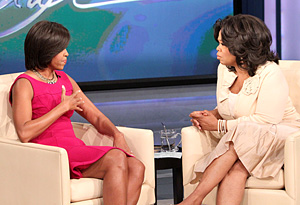
First Lady Michelle Obama says she will do everything she can to put the soldiers and their families in the forefront of people's minds. The First Lady says she used to not know anyone serving in the war, but that all changed when she hit the campaign trail a few years ago. During that time, she met military families across the country and says she was left in awe of their strength and sacrifice.
"Their stories took my breath away, and I vowed that if my husband had the honor of serving this country, that I would be that voice [for them]," says Mrs. Obama.
She says it's a challenge to get the message out about military families because they never ask for help. "They are buckling down and making it through, so it's easy for us to forget. That's why we have to lift these families up," Mrs. Obama says.
"Their stories took my breath away, and I vowed that if my husband had the honor of serving this country, that I would be that voice [for them]," says Mrs. Obama.
She says it's a challenge to get the message out about military families because they never ask for help. "They are buckling down and making it through, so it's easy for us to forget. That's why we have to lift these families up," Mrs. Obama says.
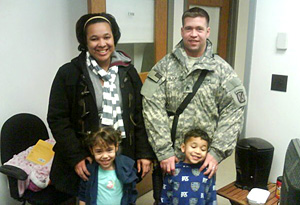
Mrs. Obama calls Army wife Carmen one of her heroes. Carmen has been married to her husband, Clifford, for 10 years and the couple has two children. Carmen and Clifford have talked about adding a third child to their family, but with Clifford set to deploy sometime this year, the couple has decided to wait. "A pregnancy now would only result in him missing the first year of our child's life," says Carmen.
A day in the life of Carmen and her family
The couple says Clifford's deployments cause a lot of pressure on their family—even when Clifford is returning home. "That is something that is hard and that I have anxiety about, because I want to make sure the transition is smooth...because I'm aware that we've done things and we've grown without him, and we don't want him to feel like we didn't need him."
The First Lady says that Carmen is one of her heroes, because in addition to taking care of her own family's needs, she's incredibly involved with helping other military families. "She's helping other families adjust, she's delivering bad news and being there for other spouses when their husbands are away," Mrs. Obama says. "So she's shouldering, in addition to her own burden, and this is typical. This is typical of our military families—holding it together, making it happen."
A day in the life of Carmen and her family
The couple says Clifford's deployments cause a lot of pressure on their family—even when Clifford is returning home. "That is something that is hard and that I have anxiety about, because I want to make sure the transition is smooth...because I'm aware that we've done things and we've grown without him, and we don't want him to feel like we didn't need him."
The First Lady says that Carmen is one of her heroes, because in addition to taking care of her own family's needs, she's incredibly involved with helping other military families. "She's helping other families adjust, she's delivering bad news and being there for other spouses when their husbands are away," Mrs. Obama says. "So she's shouldering, in addition to her own burden, and this is typical. This is typical of our military families—holding it together, making it happen."
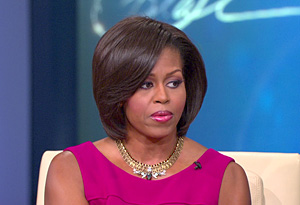
Along with Vice President Joe Biden's wife Jill Biden, the First Lady is launching a campaign to support military troops and their families. She says their goals include ending homelessness among veterans, making mental health support available to military families and veterans, focusing on the needs of military children in school and dealing with the many employment issues that come along with moving from base to base.
"[This is] not about kind words—this campaign is going to be about action," Mrs. Obama says. "You don't have to live near a base, you don't have to be a military expert, you don't have to know a family. There is so much you can do to support people just by doing what you do."
The First Lady says you may have an occupational skill, like counseling or accounting, that you can offer to military families in your community. You could even do something as simple as offering a well-deserved girls' night out to a military mom. "There are things as a nation we can do, big and small. It's not a difficult thing to do," says the First Lady.
Visit serve.gov to learn more about Mrs. Obama's new program to support military families and find out how you can help.
"[This is] not about kind words—this campaign is going to be about action," Mrs. Obama says. "You don't have to live near a base, you don't have to be a military expert, you don't have to know a family. There is so much you can do to support people just by doing what you do."
The First Lady says you may have an occupational skill, like counseling or accounting, that you can offer to military families in your community. You could even do something as simple as offering a well-deserved girls' night out to a military mom. "There are things as a nation we can do, big and small. It's not a difficult thing to do," says the First Lady.
Visit serve.gov to learn more about Mrs. Obama's new program to support military families and find out how you can help.



